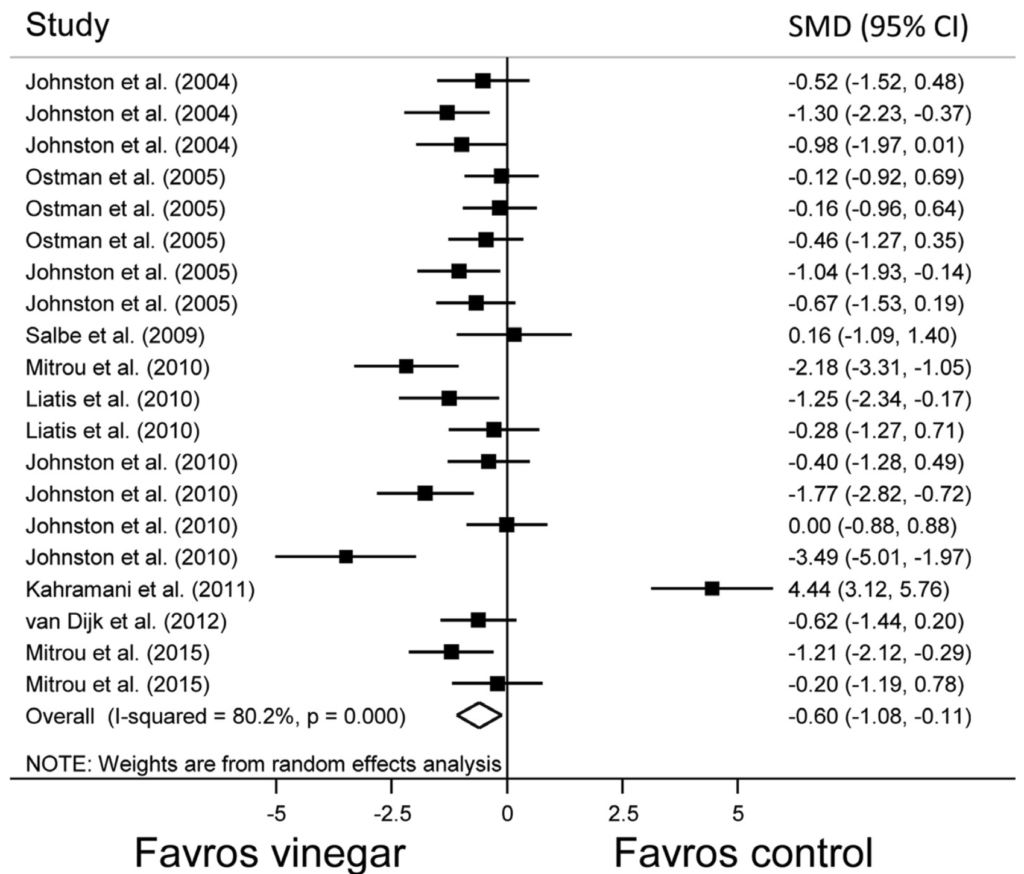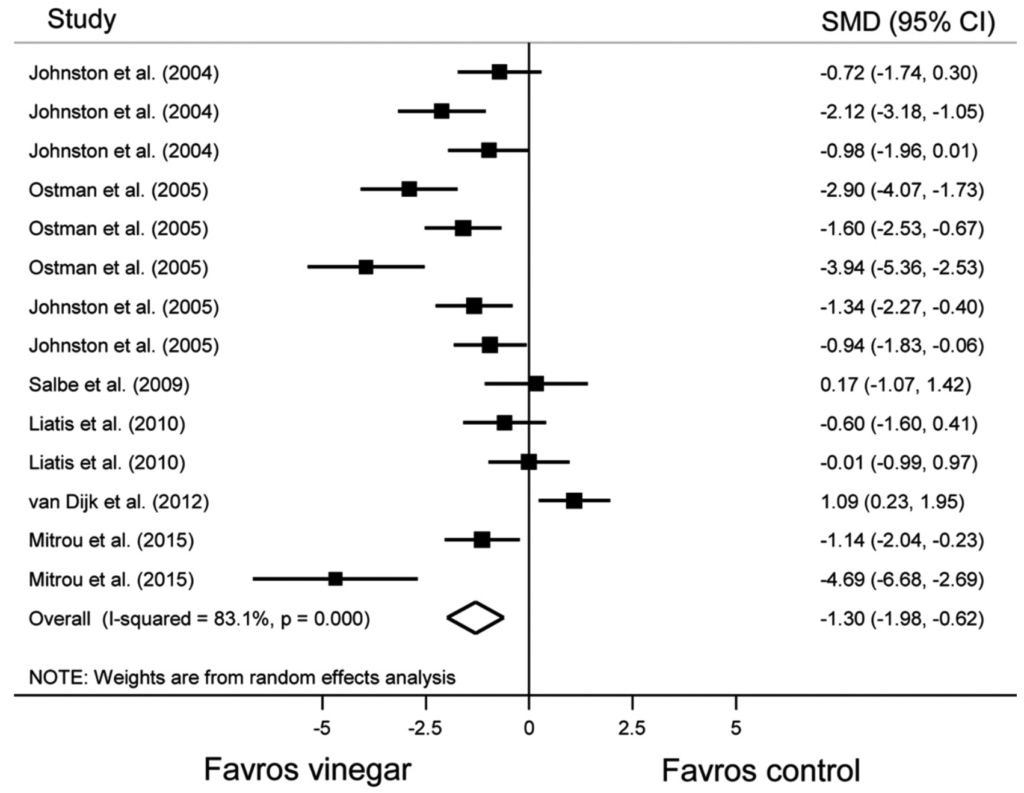Get new posts by email or rss feed
Summary
About a week ago a reader, /u/genetastic, reached out about collaborating on experiments to determine the effect of vinegar on blood glucose after meal consumption.
Like most of you, I had heard all the nigh-magical, pseudoscience claims about using apple cider vinegar to treat diabetes. However, when you dig into the literature, there’s a sizable number of peer-reviewed studies, including several decent meta-analyses, showing that consumption of vinegar with a meal can reduce the blood glucose impact in both diabetic and non-diabetic subjects (see background below for details). There’s also a lot of open questions, including:
- Is the effect large enough to matter for practical meals?
- What types of meals does vinegar affect?
- What is the best protocol to get a large effect without unpleasant side effects?
- What’s the underlying mechanism?
- Is the effect specific to vinegar or do other acids work?
/u/genetastic, a third collaborator /u/kabong, and I decided to answer these questions with community self-experiment.
Below, I give more details on the background literature and pre-register our protocol and analyses.
It would significantly improve the study to have a larger number of participants. If you’re interested in collaborating on this or other scientifically rigorous self-experiments with low-carb foods, supplements, or other health interventions, please let me know in the comments or via the contact form on the right.
Details
Purpose
- To replicate (or fail to replicate) the existing literature and quantify the effect of vinegar on blood glucose level after consumption of complex carbohydrates.
- To better understand the underlying mechanism by determining how this effect varies with person/metabolic status, dose, source of calories, and type of acid.
Background
Link to list and summaries of literature reviewed
Over the past 20 years, several clinical trials have shown that consumption of vinegar with a meal can reduce the post-meal blood glucose concentration on both non-diabetic and diabetic patients. A meta-analysis of 11 high-quality studies showed a significant and systematic reduction in glucose and insulin area under the curve (see Figures 1 & 2).


Based on this, I believe that vinegar has an effect. However, there’s no clear consensus on how or why vinegar lowers blood glucose. Various mechanisms have been proposed, including:
- Delayed gastric emptying
- Increased glucose uptake by muscles
- Inhibition of alpha-amylase, leading to slower breakdown of starches
I’m particularly intrigued by the work of the Le Feunteun group, that argues that the effect is not due to vinegar specifically, but rather reduced pH slowing the breakdown of starch by inhibiting the enzyme alpha-amylase. Supporting this claim:
- They did some really nice in-vitro studies showing that alpha-amylase is inhibited by pH and that when it’s inhibited starch breakdown and sugar release is slowed significantly.
- They then tested this in humans with lemon juice and showed the same inhibition and delayed starch breakdown, along with a reduced BG impact similar to that observed with vinegar.
- Separately, other groups have shown:
- All together this is decent evidence for the acid as inhibitor of alpha-amylase as mechanism hypothesis
One of the biggest challenges in the vinegar/acid literature is that all of the experiments were done with different meals, protocols, and doses, making it difficult to integrate data from multiple studies. To address this issue and answer some of the open questions about this effect, /u/genetastic, /u/kabong, and I decided to do a series of community self-experiments.
While we each have different motivations and interests, overall, the questions we’re looking to answer are:
- Is the effect large enough to matter for practical meals?
- What types of meals does vinegar affect?
- What is the best protocol to get a large effect without unpleasant side effects?
- What’s the underlying mechanism?
- Is the effect specific to vinegar or do other acids work?
To answer these questions, we will be conducting experiments using the protocol below.
Methods
Materials
- Meals:
- white bread (starch)
- dried dates (simple sugars)
- tortilla with beans, salsa, & avocado (starch, fat, and protein)
- Vinegar:
- Apple cider or white vinegar
- As large a quantity as comfortable, not to exceed 30g
- Diluted in as little water as tolerable
Blinding
- Vinegar supplementation will not be blinded
- However, the protocol was established in advance and adhered to without modification once experiments started.
Procedure
- Each participant is using a slightly different procedure
- QD (u/sskaye):
- Meals are eaten contemporaneously with vinegar or an equal amount of water at ~10:30a.
- Blood sugar is monitored for 5h using a Dexcom G6, with calibration performed 15-30 min. before the start of each experiments.
- Treatments are alternated daily V-/V+/W (V-: meal with no vinegar; V+: meal with vinegar; W: wash/no experiment.
- u/genetastic:
- Meals are eaten contemporaneously with vinegar between breakfast/lunch. CGM data is checked to make sure that BG is at baseline before a test.
- Treatments are alternated daily with no wash period.
- u/kabong:
- Meals are eaten contemporaneously with vinegar.
- Blood sugar is monitored for 3h using a Freestyle Libre, with calibration using a fingerstick meter.
- Treatments are 3x per week, each at the end of a >24h fast.
Measurements
- Glucose: Dexcom G6, and Freestyle Libre CGM
Analysis
- Peak blood glucose, iAuC, and time to peak blood glucose will be calculated for each experiment
- Student’s t-test will be used to test if the values for any of the above metrics were different with and without consumption of vinegar.
- Additional exploratory analysis may be done based on the data, but will be noted as such
Data Processing & Visualization
iAUC will be calculated using the trapezoid method. Data will be visualized using Tableau.
Data
All data will be posted after analysis.
Results & Discussion
Results will be posted and discussed after the data is analyzed.
Conclusions & Next Experiments
Conclusions & next experiments will be posted after the data is analyzed.
– QD